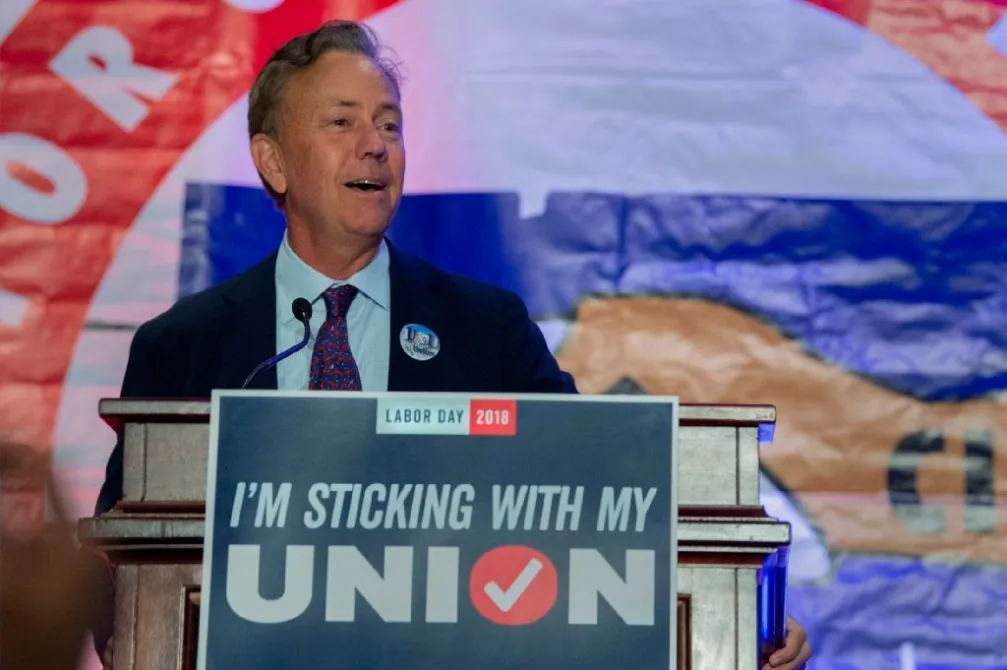
State employee unions continue to spar with Gov. Ned Lamont’s administration over past-due raises, with two more bargaining units breaking off talks late Wednesday with the executive branch.
Correction officer supervisors and education professionals both declared impasses, bringing to six the number of units that now can seek arbitration over wages and working conditions.
“Gov. Lamont doesn’t know what it’s like to work inside these facilities every day — and his latest offer makes that clear,” said Lt. Thomas Titus, president of the Correction Supervisors’ Council.
Titus didn’t disclose specifics of wage or other proposals but added, “We won’t accept a lowball offer. Our members have earned fair pay and we’re going to keep fighting for it.”
Union leaders have said the Department of Correction is dangerously understaffed and that employees often are pressed into excessive, mandatory overtime.
The department accounted for $118.8 million or 38% of state agency overtime spending last fiscal year, according to the legislature’s nonpartisan Office of Fiscal Analysis.
Jennifer Corti, president of the unit representing education professionals in five state agencies, said workers likely will be stretched thinner in the coming years as Connecticut grapples with huge cuts in federal assistance.
“Our members, and the people we serve every day, deserve to know that Gov. Lamont is serious about protecting Connecticut from the fallout of federal chaos,” Corti said. “So given the stakes, and the lack of progress at the table, declaring impasse and moving toward arbitration is now the only responsible option.”
The governor has countered repeatedly that state employees have received raises every year since he took office in January 2019 and that would continue under the new agreements.
“There shouldn’t be any confusion” among workers about the administration’s desire to award raises, Lamont said shortly after four unions broke off talks in mid-July. “They know we have well over $100 million earmarked in this budget. They know that we’ve said, ‘You’re going to get a raise.’”
Lamont, a Democrat, has been accused by Republican legislators and conservative groups of being too generous with state employee compensation.
During the past four fiscal years, all unions have received annual cost-of-living raises of 2.5%. And all but the most senior workers remain eligible for a yearly step hike as well, which reflects increased experience and typically adds another 2 percentage points to the value of the raise.
Thirty-five bargaining units, which represent the overwhelming bulk of state government’s 40,000-plus workforce, have been negotiating new wage hikes since January. And they’ve been working under expired contracts since July 1.
The lone exception is the state police troopers’ union. Lamont negotiated a 2.5% cost-of-living hike plus a step raise for that group last spring, and legislators ratified the deal in mid-May.
The governor, who is expected to seek a third term in office next year, has been at odds with most of his labor base this year, despite assurances that raises are forthcoming.
The union representing 1,300 probation officers, information technology analysts, assistant clerks, counselors and other judicial branch support staff announced July 2 it would seek arbitration.
Six days later, two more bargaining units, representing judicial marshals and their immediate supervisors, also ended talks. In all three instances, labor officials charged the administration was offering $2,000 one-time payments in lieu of ongoing raises. The governor’s office countered there had been a misunderstanding and that ongoing raises were on the table.
Still, a fourth bargaining unit, representing rank-and-file correction officers, declared an impasse on July 16.
Contract negotiations typically address work conditions and other issues besides compensation. And though neither side has discussed negotiations in this area, talks were expected to include one particularly sticky point: working from home.
The governor and many Republican legislators in recent years have expressed increasing concerns over remote-work rules, which were established shortly after COVID struck Connecticut in spring 2020. Unions have been reluctant to alter those work-from-home rules, arguing they have helped many workers become more productive.
Union leaders and the fiscally moderate governor don’t see eye-to-eye over controversial budget caps that have generated unprecedented surpluses in recent years. Connecticut has used those caps, which Lamont strongly supports, to generate an extra $8.5 billion to reduce its pension debt. Labor officials, and many of Lamont’s fellow Democrats in the legislature, counter Connecticut is saving too aggressively for its pensions, leeching needed dollars away from education, health care and other core services.
And tensions between the governor and some unions also have been heightened recently by Lamont’s interest in investing state pension assets in the Connecticut Sun to keep the WNBA franchise in the state.
Council 4 of the American Federation of State, County and Municipal Employees, the single-largest union in state government, representing more than 14,000 workers, released a statement last week urging Lamont to suspend that effort and focus on wage negotiations.
“State employees have been without a contract since July,” Jody Barr, Council 4’s executive director, said Wednesday, adding that the two sides have been negotiating wage and working conditions since January. “They think that this governor’s focus should be at the table negotiating for his employees.”
The Connecticut Police and Fire Union joined that debate late Tuesday, also urging Lamont to put basketball on the backburner.
“Enough is enough Governor Lamont,” the union wrote in a statement posted to its website. “Return to the table with us. Finish our contract, give our members the confidence their future will be secured, and let’s stop losing our people to municipalities and career changes. Until all our members can feel protected by their contract and retirement agreements, any discussion about investing our pension funds should be ceased.”
The union represents about 950 police, fire and other public safety personnel who protect state colleges and universities, office buildings, mental health facilities, airports and parks. Its members also include Department of Motor Vehicles testing officers and state liquor control agents. The union does not include state police troopers.
But the governor said earlier this week that Council 4’s objections weren’t giving him pause.
“No, I think their concerns were probably more about a contract than the Connecticut Sun,” he said. “But more importantly, it’s a good investment, and I can tell you that the treasurer wouldn’t do a deal regarding the Connecticut Sun if it wasn’t a good investment.”
CT Mirror reporters Mark Pazniokas and John Moritz contributed to this story.



